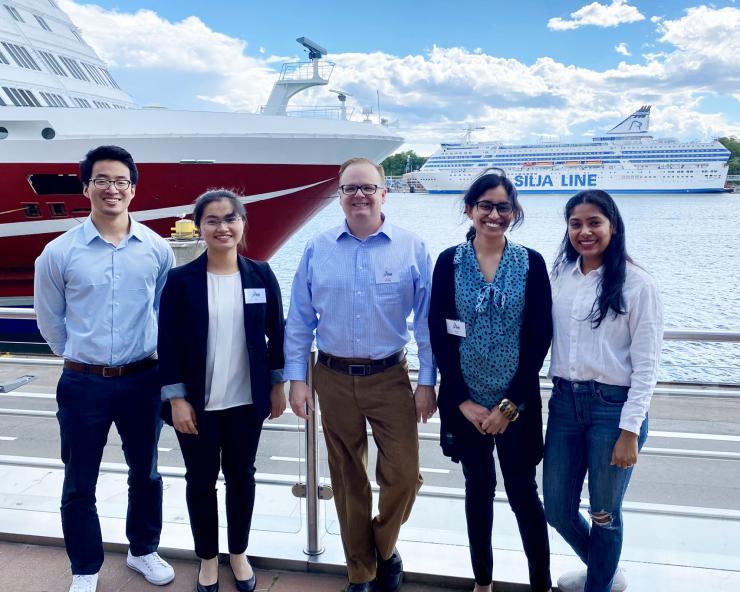Faculty and Students Present Research at Nanotechnology Conference
Jun 30, 2022 — Atlanta, GA

Carson Meredith standing outside in Finland with Georgia Tech Ph.D. students: Yue Ji (ChBE), Li Zhang (MSE), Nasreen Khan (ChBE), and Udita Ringania (ChBE).
This summer, a faculty and student group from the Renewable Bioproducts Institute (RBI) at Georgia Tech attended TAPPI’s International Conference on Nanotechnology for Renewable Materials (TAPPI Nano) in Helsinki, Finland from June 13-17. This is a leading conference that attracts professionals, researchers, and corporations conducting research or using nanotechnology focused on renewable materials.
On average, the event draws more than 400 academics, industry leaders, and researchers from more than 25 countries around the world. This year's event featured more than 100 technical presentations, four keynote speakers, end-user panels, and poster presentations. The conference is designed to help attendees gain insights into the latest advancements in research and actual application in today’s newest renewable material products.
“Nanotechnologies are now being used commercially in renewable products in the paper and pulp industries,” said Carson Meredith, executive director of RBI. “In that industry, nanomaterials are being used mainly as an additive—such as for corrugated packaging. They are finding that small amounts of these additives can reduce the amount of fiber needed. New additives can also be used to acquire unique combinations of properties such as higher strength with less weight or help to color paper white with more environmentally friendly methods..”
Nanotechnology in the renewable bioproducts industry is enabling large-scale financial savings and helping to conserve resources when making paper products according to Meredith who is also a professor and the James Harris Faculty Fellow in the School of Chemical and Biomolecular Engineering.
Georgia Tech faculty and student presenters listed in the conference agenda included:
Talks at TAPPI Nano2022
- Session 12. Nanocellulose for Stronger or Lighter Glass Fiber Polyester Composites - Kyriaki Kalaitzidou
- Session 23. Consumer Gatekeeping in Sustainable Materials Streams - Nasreen Khan
- Session 25. Dewatering of Cellulose Nanofibrils Using Ultrasound - Udita Ringania
- Session 32. Minimizing Oxygen Permeability of Cellulose/Chitin Nanomaterials as Multilayer Coatings by Tuning Chitin Deacetylation - Yue Ji
Posters at TAPPI Nano2022
- Zero-angle Depolarized Dynamic Light Scattering for Characterization of Cellulose Nanomaterials - Li Zhang
- The Influence of Polyelectrolyte Complex Phase Behavior on Water Retention Values of Cellulose Nanofibers - Nasreen Khan
- Dewatering of Cellulose Nanofibrils Using Ultrasound - Udita Ringania
Kyriaki Kalaitzidou is an assistant professor in the Woodruff School of Mechanical Engineering and strategic coordinator for circular materials for RBI. The four doctoral students presenting included Yue Ji, Nasreen Khan, and Udita Ringania from the School of Chemical and Biomolecular Engineering; and Li Zhang from the School of Materials Science and Engineering.
TAPPI, formed in 1915, is the leading association for the worldwide pulp, paper, packaging, tissue, and converting industries.
Carson Meredith with Georgia Tech Ph.D. students: Yue Ji (ChBE), Li Zhang (MSE), Nasreen Khan (ChBE), and Udita Ringania (ChBE).
Walter Rich




